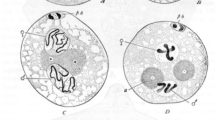Abstract
Heat shock (43°C, 45 min) induced transient nuclear accumulation of p53 in primary human fibroblasts without any clonogenically toxic effects. The accumulation of p53 reached a maximal level 3∼5 h after heat shock, and returned to the basal level within 12 h. Following the increase in p53 level, cell cycle arrest at G1/S was observed in normal fibroblasts, whereas neither nuclear accumulation of p53 nor cell cycle arrest were observed in HeLa cells. By comparing cell cycle patterns of heat-treated mouse cells with different genotypes at the p53 locus (+/+, +/−, −/−), the observed cell cycle arrest at G1/S was demonstrated to be p53-dependent. Cell cycle arrest in normal human fibroblasts continued for nearly 24 h, resulting in a one day delay of cell growth compared with non-treated cells. Following enhancement of the p53 level, the amount of p21/WAF1/CIP1 increased, and the high level of p21 was sustained for almost one day in a cell cycle-independent manner, suggesting the involvement of p21 in the inhibition of cell cycle progression by heat shock.
Similar content being viewed by others
Author information
Authors and Affiliations
Rights and permissions
About this article
Cite this article
Nitta, M., Okamura, H., Aizawa, S. et al. Heat shock induces transient p53-dependent cell cycle arrest at G1/S. Oncogene 15, 561–568 (1997). https://doi.org/10.1038/sj.onc.1201210
Received:
Revised:
Accepted:
Issue Date:
DOI: https://doi.org/10.1038/sj.onc.1201210
- Springer Nature Limited
Keywords
This article is cited by
-
Chicken pituitary transcriptomic responses to acute heat stress
Molecular Biology Reports (2023)
-
Regulation of P53 signaling in breast cancer by the E3 ubiquitin ligase RNF187
Cell Death & Disease (2022)
-
The effect of heat stress on the cellular behavior, intracellular signaling profile of porcine growth hormone (pGH) in swine testicular cells
Cell Stress and Chaperones (2022)
-
Mechanism of continuous high temperature affecting growth performance, meat quality, and muscle biochemical properties of finishing pigs
Genes & Nutrition (2019)
-
Interplay between HSF1 and p53 signaling pathways in cancer initiation and progression: non-oncogene and oncogene addiction
Cellular Oncology (2019)



